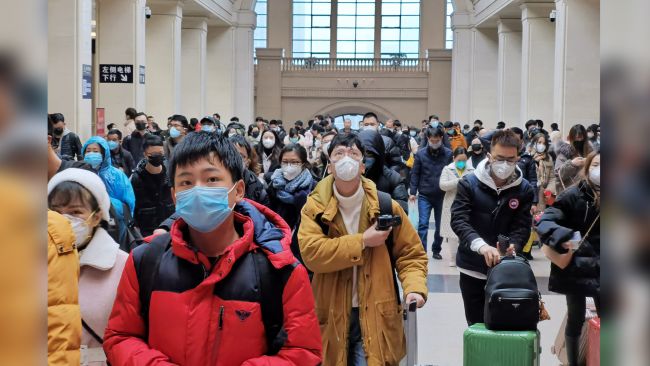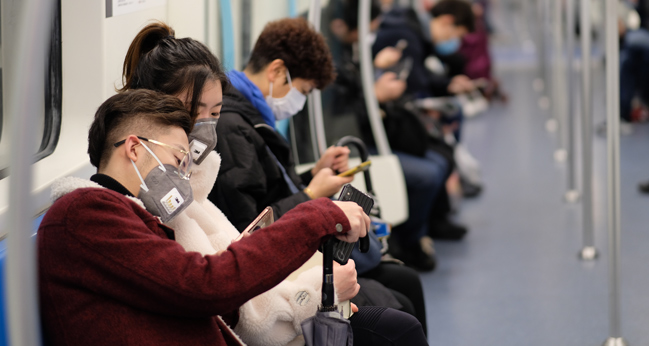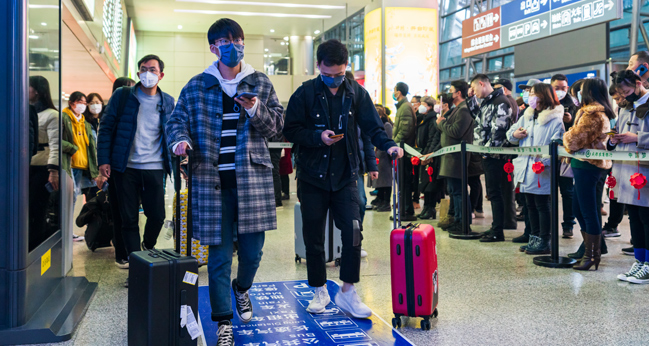About Coronaviruses
As the new Wuhan coronavirus has spread not solely over mainland China but also worldwide, panic amongst people is rising day-by-day. Inside China, there is a growing sense of helplessness, because the government is forced to take severe steps to prevent the virus, including some travel restrictions in Beijing. Death toll in China nears 1,500, confirmed cases cross 65,000. Meantime, the World Health Organization (WHO) has warned that confirmed cases of coronavirus are spread among people who have never moved to China. The first possible case of this virus in Ontario was identified on 25th January 2020 and has evidence of limited human-to-human transmission.
What are Coronaviruses?
Coronaviruses are a large family of viruses that can cause illnesses varying from the common cold to serious respiratory infections like bronchitis, pneumonia or serious acute respiratory syndrome (SARS). Some causes illness in humans and others cause illness in animals, such as bats, camels, and civets.
- Coronaviruses are spread mainly from person to person through close contact, for example, in a household, workplace or health care center.
- Some human coronaviruses spread easily between people, whereas others don’t.
Your risk of critical illness is also higher if you’ve got a weakened immune system. This might be the case for:
- Older people
- People with chronic illness (for example, diabetes, cancer, heart, renal or chronic lung disease)
Advice if your child has a fever and cough
If your child gets a fever and cough, this is what you should do:
1) Call your doctor’s office for advice specific to your child and your community.
2) If your doctor does not think your child needs to be checked, you can help them feel better by
- being sure they stay hydrated. Make sure they are drinking regularly. Popsicles are a good way to get fluids in and can relieve a painful throat.
- using acetaminophen or ibuprofen for fever. Check with your doctor’s office about the right dose for your child.
- using a humidifier to help with congestion.
- restricting the use of over-the-counter cold medicines in children under the age of 6. They don’t help much (even with kids over 6) and can have side effects. In children over a year, honey can relieve a cough. Use saltwater drops for stuffy noses.
Watch for warning signs of problems, and seek medical attention if they occur:
3) any difficulty breathing (rapid or heavy breathing, sucking in around the neck or ribs, looking pale or bluish)
harsh cough that won’t stop
4) high fever that won’t come down with acetaminophen or ibuprofen
5) extreme sleepiness
6) irritability or pain that you cannot soothe
7) refusal to take fluids, or any signs of dehydration (dry mouth, no tears when crying, not urinating at least every six hours).
Tips to deal with the coronavirus in India
Travelers who have returned from mainland China should:
- Contact the local public health unit within 24 hours of arriving in India
- Stay at home and avoid close contact with others, including those in your home, for a total of 14 days from the date you left China
- Monitor themselves for symptoms of the 2019 novel coronavirus for 14 days after leaving mainland China
What should one do if he/she comes into contact with a person with coronavirus in India?
If you have been identified as a contact of a person with proved coronavirus infection in India, the local public health unit will contact you with advice within 24 hours of arriving in India. This advice will include that you need to isolate yourself at home for 14 days after contact with the infected person, and to monitor your health and report any symptoms.
What are the symptoms and treatments from the 2019 novel coronavirus?
Symptoms range from mild – like the flu and other common respiratory infections – to severe, and can include:
- fever
- cough
- difficulty in breathing
Complications from the 2019 novel coronavirus can include serious conditions, like pneumonia or kidney failure, and in some cases, death.
There are no specific treatments for coronaviruses, and there is no vaccine that protects against coronaviruses. Most people with common human coronavirus illnesses will recover on their own. You should:
- drink plenty of fluids
- get rest and sleep as much as possible
- try a humidifier or a hot shower to help with a sore throat or cough
If you need immediate medical attention you should call 911 and mention your travel history and symptoms.
How to protect yourself from the 2019 novel coronavirus?
There is no vaccine available to protect against the 2019 novel coronavirus. One should follow everyday actions that can help prevent the spread of germs that cause respiratory illnesses.
Take these everyday steps to reduce exposure to the virus and protect your health:
- Wash your hands often with soap and water
- Sneeze and cough into your sleeve
- Avoid touching your eyes, nose or mouth
- Avoid contact with people who are sick
- Stay home if you are sick
If you are traveling to an area known to have cases of coronavirus, be sure to avoid:
- high-risk areas such as farms, live animal markets, and areas where animals may be slaughtered
- contact with animals (alive or dead), including pigs, chickens, ducks, and wild birds
- surfaces with animal droppings or secretions on them
What is the scientific name of Coronavirus and its sources of origin?
The scientific name of coronavirus is “2019 novel coronavirus” (2019-nCov). It is a respiratory infection that originated in Wuhan, China.
Which are the current affected areas?
Mainland China is identified as the major affected areas and the travelers who have returned from Hubei province, including Wuhan City.

Coronavirus in India
A total of 1,999 people, who have a travel history from China and other affected countries, are under observation in Kerala, of whom 75 are in isolation wards of various hospitals. The remaining 1,924 are under home quarantine and have been asked to not go out in public until the end of the 28-day incubation period.
On 14th Feb, almost two weeks after the evacuation, the government reported that all Indian evacuees from Wuhan – 645 of them have tested negative for 2019-nCoV. Over 11,500 individuals are presently under community surveillance in 34 states/union territories and contact tracing is going on. As of now, 1,632 samples from suspected patients have been tested from across the country of which three samples have tested positive; all from the state of Kerala. Interestingly, reports indicate that all three patients are medical students undergoing training in Wuhan.
The latest data indicate that about 82% of cases are mild, 18% cases are severe, of which 3% require intensive care; and that the fatalities are mostly old patients and those with pre-existing conditions. Many medical personnel is getting affected as well.
What is the Indian government doing?
A new travel advisory has been issued directing everyone to avoid traveling to China, saying planned visitors from China might apply for a fresh Indian visa. Apart from that, if anyone with a history of travel to China since January 15th, 2020, could be quarantined.
Are Indian airlines still flying to China?
All Indian airlines have suspended flights to China. Air India, IndiGo, and other Indian airlines have suspended flights to China over the coronavirus risks.
Where are the screening wards in India located for Coronavirus?
Screening wards in India city-wise:
|
City
|
Screening Wards
|
|
Delhi
|
Manesar Camp, Ram Manohar Lohia, AIIMS, and Safdarjung hospital.
|
|
Mumbai
|
Kasturba hospital and Pune’s Naidu hospital
|
|
Karnataka
|
Government Wenlock Hospital, Mangaluru International Airport
|
|
Manipur
|
5-centers have been opened in different border towns of the state and at the Imphal International Airport to screen people for coronavirus.
|
|
Mizoram
|
India-Myanmar border is being tested at Zokhawthar.
|
Updates on 2019 novel coronavirus in India
- The patient who first examined positive for coronavirus is now hospitalized in Thrissur Medical College and her condition is stable.
- The 2nd case of coronavirus in the country was reported from Kerala and the patient is being monitored in an isolation ward at Alappuzha Medical College.
- The 3rd case of coronavirus was seen in Kerala and the patient has been kept under isolation at the Kanhangad in Kasaragod district and his condition is also stable.
- Dr. Harsh Vardhan, Union Health Minister said that the center is taking complete preventive steps regarding the coronavirus outbreak.
- To date, India has screened 1,118 flights so far.
- DGCA has exempted flight crews from Breath Analyser (BA) tests for 15 days at Kerala’s Calicut, Kannur, Trivandrum and Cochin airports following the novel coronavirus outbreak.
- 3,252 people under observation in Kerala for Coronavirus.
- Over 1.9 lakh passengers screened for Coronavirus at airports, 9,452 persons under surveillance, as per the Health Ministry.
Where did the new coronavirus (2019-nCov) come from?
As per the local people, the virus (2019-nCov) first appeared in Wuhan, China in people who had visited a local seafood and animal market (called the Huanan seafood market).
How does the coronavirus spread between people?
Centers for Disease Control and Prevention (CDC) states that human coronaviruses are most commonly spread from one infected person to another via:
- The air (sneeze or from viral particles from a cough)
- Close personal contact (shaking hands or touching)
- An object or surface with viral particles on it (then the touching nose, eyes, and your mouth before washing your hands)
- And rarely from defecation contamination.
Is the virus being spread from one person to another?
The novel coronavirus (n-CoV) can be spread from one person to another most likely by coughing or contact with respiratory issues of people infected with the virus.
There have been a small number of cases of transmission from person to person taking place outside of mainland China.
How is the coronavirus diagnosed?
Infection with 2019-nCoV is diagnosed by detecting confirmation of the virus in respiratory samples such as fluid from the lungs or swabs from the throat. An infected person can immediately ask for the local public health unit.
Who is at risk?
People who have visited mainland China (excluding Hong Kong, Macau, or Taiwan), or who have had contact with an infected person, in the past 14 days may be at risk of catching the disease.

Which countries are infected from Coronavirus?
Here’s the list of Coronavirus cases country-wise:
|
Country Name
|
Coronavirus Cases
|
|
Mainland China
|
37,232
|
|
Thailand
|
32
|
|
Japan
|
25 (+70 on a cruise ship off the coast)
|
|
Singapore
|
40
|
|
Hong Kong
|
29
|
|
South Korea
|
25
|
|
Taiwan
|
18
|
|
Australia
|
15
|
|
Malaysia
|
16
|
|
Germany
|
14
|
|
Vietnam
|
13
|
|
Macau
|
10
|
|
The U.S.
|
12
|
|
France
|
11
|
|
UAE
|
7
|
|
Canada
|
7
|
|
Italy
|
3
|
|
Russia
|
2
|
|
UK
|
3
|
|
Philippines
|
3
|
|
Cambodia
|
1
|
|
India
|
3
|
|
Belgium
|
1
|
|
Finland
|
1
|
|
Nepal
|
1
|
|
Spain
|
1
|
|
Srilanka
|
1
|
|
Sweden
|
1
|
Data source: livescience.com
What is being done globally to stop the spread of the coronavirus?
- The Chinese government put Wuhan and many other nearby cities on “lockdown,” meaning people are not allowed in or out of the area.
- The governments of both Taiwan and Hong Kong have said they would not allow in anyone from the Hubei Province (where Wuhan is located).
- Major airports in the U.S. are conducting screenings to try to check for symptoms of the virus.
- The Chinese government has banned the sale of wildlife in markets, restaurants and online.
- Also, U.S. citizens, permanent residents and immediate families who have visited China’s Hubei province will undergo a mandatory two-week quarantine. And “foreign nationals” who have traveled to China in the past 14 days won’t be allowed in the U.S.
- If Americans visited any other part of China, they will be screened at airports and asked for self-quarantine for 14 days.
- Australia is also barring entry to non-citizens who have recently visited China.
- Flights carrying passengers from China will be rerouted to one of 11 U.S. airports.
How can people protect themselves and others from Coronavirus?
According to the Centers for Disease Control and Prevention (CDC), the best way to prevent infection with 2019-nCoV is to avoid being exposed to the virus. In general, the CDC recommends the following to prevent the spread of respiratory viruses:
- People who traveled to China and became sick with fever, difficulty in breathing or cough within the following 2-weeks should ask for medical care instantly and call first to inform the medical staff about their recent travel.
- Avoid close contact with people who are sick
- Stay at home when you are sick
- Clean and sanitize frequently touched objects and surfaces.
- Wash your hands often with soap and water for at least 20 seconds
- If traveling to China, you should avoid contact with sick people, avoid dead or alive animals, animal markets or products that come from animals such as uncooked meat.
- Avoid touching your nose, eyes, and mouth with unwashed hands
What scientists are doing across the US?
Scientists are trying to invent a vaccine for the new virus across the US. The National Institute of Health (NIH) is working on it, but it will take at least a few months before clinical experiments start and more than a year until a vaccine might actually be available in the market.

What if one doesn’t have medicare or healthcare facilities?
To help the NSW response to coronavirus, people will not be charged out of pocket expenses who are not eligible for medicare and presenting to NSW Health facilities for coronavirus assessment.
Most people that are not eligible for medicare will have health or travel insurance. For those that do not have sufficient insurance coverage, NSW Health will cover these costs.
These arrangements have been put in place to ensure payment issues are not a difficulty for people from overseas with respiratory symptoms demanding immediate medical help.
Is there any specific treatment or a vaccine?
Currently, there are no specific treatments and available vaccines that protect against coronaviruses. Early diagnosis and general supportive care are necessary.
Indian coronavirus cases on Diamond Princess cruise ship
The latest coronavirus cases in India are reported from the Diamond Princess cruise ship quarantined off the coast of Yokohama in Japan. Three crew members from India have tested positive for the virus on the ship as of 15 February. A total of 138 passengers and crew members from India are reportedly on board the ship.
What arrangements are in place for checking people at airports?
The Indian Government has put in place protective measures at all international airports for passengers coming from China.

Global Updates on 2019 novel coronavirus
- According to the Johns Hopkins virus dashboard, approximately 42,000 individuals globally (primarily in mainland China) have been confirmed to have the new coronavirus.
- 1,000 deaths linked to the virus.
- More than 800 Americans have been evacuated from Wuhan on four flights.
- Wuhan officials plan to round up those suspected of being infected into mass quarantine camps.
- There have been two deaths, one in the Philippines and the other in Hong Kong.
- A 60-year-old U.S. citizen in Wuhan has died after being infected with the coronavirus.
- As per the Times report, around 3,700 people are being quarantined on the Diamond Princess cruise ship off Japan due to the coronavirus, with 70 individuals testing positive so far.
- The 34-year-old Chinese doctor who was silenced by police for warning about the coronavirus outbreak has died after contracting that virus.
- A phase 1 trial of a new vaccine against 2019-nCoV by Dr. Anthony Fauci, is on track to begin in 2.5 months.
- Fauci stated that there have been “no glitches so far” in the steps to prepare the vaccine which involves initial studies in lab dishes and animals.
- According to U.S. Secretary of State Mike Pompeo, the U.S. is ready to spend up to $100 million to support China and other countries in fighting the virus.
- U.S. citizens, permanent residents, and immediate family who have visited China’s Hubei province will now undergo a mandatory 2-week quarantine.
- The total number of deaths in China now at 1,367 out of 59805 confirmed cases until 13th Feb.
- With 44 new cases, the total number of affected on quarantined Japan cruise ship now stands at 218
- China’s capital Beijing imposes a 14-day quarantine on arrivals
- Golf-Kuala Lumpur and Shenzhen events postponed due to coronavirus outbreak
- WHO says joint China mission to start coronavirus investigations this weekend
- Top Australian Universities say Chinese students could quit Australia
- According to ministry communication, 2148 flights and 232613 passengers from China have been screened so far.
- Outside China, the biggest group of Coronavirus infections is aboard the Diamond Princess cruise ship off Japan’s Yokohama, where an additional 99 cases were reported on Monday, making the total to 454 diagnosed.
- China may postpone the annual parliament session over the virus
Coronavirus Updates India
- The Indian national in UAE affected by the virus is now stable
- Three Indian crew members on an isolated cruise ship in Japan test positive for coronavirus
- Indian Embassy in Japan said it is touch with authorities for their welfare and early disembarkation
- 2 of the 3 Indians infected with the virus in Kerala test negative
- 83 under home quarantine in Odisha
- Indian aviation regulator adds passengers of four countries to be screened for Coronavirus
- Coronavirus has dented Goa’s tourism prospects
- India has screened 1,118 flights so far
- 3252 people under observation in Kerala for Coronavirus
- Over 1.9 lakh passengers screened for Coronavirus at airports, 9,452 persons under surveillance
- Existing visas, including already issued eVisa, no longer valid for any foreign national traveling from China.
- A 28-year-old man from UP’s Utraula has been kept in isolation ward. The man is a medical student in China and had returned to India 15 days ago.
- To date, 2,455 people have been placed under the monitoring of which 2,431 are under home quarantine and 24 in assigned facilities.
- So far, 381 samples of suspect cases have been sent to NIV for testing, of which results of 354 were negative.
- 17 people from Delhi who returned from abroad before coronavirus screening showed symptoms, hospitalized.
- Embassy of India in Japan said that all 4 COVID-19 positive Indian nationals as on 17th Feb 2020 receiving medical attention onshore are reacting well to the treatment. We are in regular touch with Indians onboard Diamond Princess Ship.
- PM Modi writes to Manu Joseph, nursing officer, Safdarjung Hospital, extending his heartiest congratulations to members of the medical team who helped in the evacuation of Indian citizens from Wuhan.
- India to send a consignment of medical supplies to China later this week to fight coronavirus.#India #China #kerala #coronavirus #wuhan #diamondprincess #safetytips #health #who #coronavirusupdatesImage & Data source: Ontario, Livescience.com, World Health Organisation








